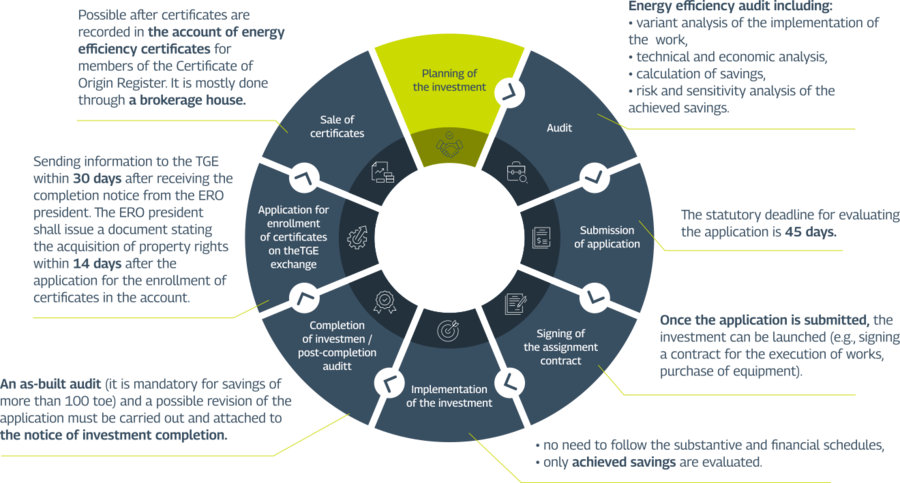How to get a white certificate step by step?
The white certificate enables obtaining additional funds for modernizations improving energy efficiency. Its purpose is to encourage entrepreneurs to implement projects aimed at improving energy efficiency. Such actions allow to reduce the amount of energy bills and take care of a positive image of the company, and after their implementation, you can count on additional funds in the form of sold certificates. We explain how to obtain an energy efficiency certificate step-by-step.

What are white certificates? Check out our article on the subject: White certificate – what is it and how does it work?
How does the process of obtaining white certificates work?
In this guide, we will present a step-by-step guide to obtaining energy efficiency certificates. The illustration below will show you the sequence of actions you need to take to apply for white certificates. It is important to plan them carefully because once the work has started, it is no longer possible to apply for these certificates. In short, your company should carry out the actions in the following order:
- Planning an energy-saving investment,
- Carrying out an energy efficiency audit,
- Submitting an application for white certificates to the Energy Regulatory Office,
- Signing an implementation agreement and starting the investment,
- Implementing the project,
- Completing the investment and, in some cases, a mandatory post-implementation audit,
- Acquiring property rights to the certificates,
- Selling white certificates on the Polish Power Exchange.

When to apply for white certificates?
White certificates are issued only for planned activities. If a company intends to invest in modernizations that improve energy efficiency, such as thermal modernization or energy recovery from industrial processes, it is worth applying for an energy efficiency certificate. In order to obtain a certificate, an application must be submitted to the President of the Energy Regulatory Office. It is important that this takes place before signing the contract with the contractor and starting the work.
Energy efficiency audit
The key condition for obtaining energy efficiency certificates is to conduct an energy efficiency audit for the selected modernization activity. The audit report should include:
- assessment of the technical condition of the modernized devices,
- variant analysis of the implementation of the works,
- technical and economic analysis,
- calculation of final energy savings in TOE.
How long does the procedure for reviewing an application for white certificates take at the Energy Regulatory Office?
After the audit, the application together with the appropriate documentation should be submitted to the President of the Energy Regulatory Office. Only then can a contract for the performance of the works be signed. The statutory deadline for assessing the application is 45 days. However, the Energy Regulatory Office's practice in this area is that on average the process of issuing an energy certificate can take even more than half a year.
Who must perform a post-implementation audit?
After the investment is completed, an energy efficiency audit is conducted again, which aims to measure whether the energy savings indicated in the application have been achieved. The obligation to perform a post-implementation audit applies to projects for which the expected savings are greater than 100 tons of oil equivalent (toe). Again, the URE practice deviates from the statutory requirements and the official may request a post-implementation audit for activities generating savings below 100 toe. This may happen when the amount of savings has changed or when the official has doubts about the information provided.
It is worth noting here that if after the investment is completed it turns out that the savings are greater than originally expected, a correction to the application can be submitted together with a repeated energy efficiency audit.
White certificate – notification to URE
Immediately after the investment is completed, we submit a notification of the completion of the undertaking. In the case of activities resulting in savings of more than 100 tons of oil equivalent, a post-implementation audit should also be attached, which will include measurement data from the reference period after the modernized installation has been launched.
How to sell white certificates?
A white certificate is associated with property rights that have a real monetary value, which means that the energy saved on average annually thanks to modernization can be cashed in on the Polish Power Exchange.
This is done through a brokerage house - the money is returned to the company's account based on an invoice.
What is the price of white certificates?
The price of a white certificate depends on the quotations on the Polish Power Exchange (TGE). The value of an energy efficiency certificate is toe, or a ton of equivalent oil. Although the quotations are variable, it is worth monitoring the current rate for toe, because their value is constantly increasing, which is related to and regulated by the amount of the substitution fee defined by the Energy Efficiency Act. Sessions take place on Tuesdays and Thursdays.